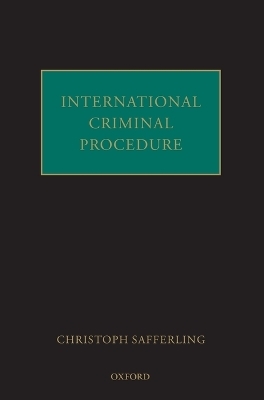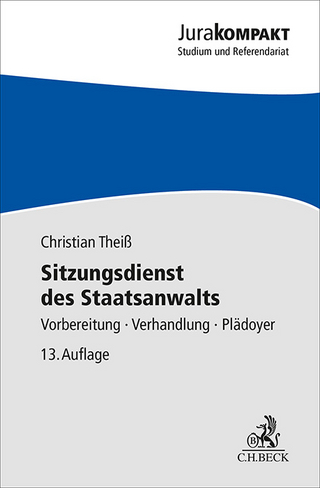
International Criminal Procedure
Oxford University Press (Verlag)
978-0-19-956288-6 (ISBN)
This book sets out and analyses the procedural law applied by international criminal tribunals and the International Criminal Court (ICC). It traces the development of international criminal procedure from its roots in the International Military Tribunal at Nuremberg to its current application by the Yugoslav and Rwanda Tribunals, the Special Court for Sierra Leone, the Extraordinary Chamber in the Courts of Cambodia, and the International Criminal Court. All of these tribunals apply a different set of rules. The focus of this book, however, lies on the ICC and its procedural regime as contained in the Rome Statute, the Rules of Procedure and Evidence, and the different Regulations of the Court and of the Prosecutor.
The exceptional compromise between common and civil law which formed the basis of the ICC's Statute created a unique procedural order. This book systematically analyses the Court's organisational structure, overall procedural setting, and the individual procedural regulations, and compares and contrasts these to other international criminal tribunals. Amongst the many unresolved procedural issues are the rights of the accused before, during, and after the trial, the disclosure of evidence, the presentation of evidence, the participation of victims, the protection of witnesses, and the cooperation between the ICC and individual states. Through looking at these issues, the book develops a concise and fitting theoretical underpinning for the ICC's procedural order that is not founded on any specific legal culture.
Christoph Safferling, 1971, (Dr. iur., LL.M.) studied law in Munich and London. He received his doctoral degree at the University of Munich in 1999, and passed the bar exam in 2000. Afterwards he held the position of Assistant Professor of Law at the University of Erlangen-Nuremberg. Since 2006 he has been Professor of Criminal Law, Criminal Procedure, International Criminal Law and Public International Law at the Philipps-University of Marburg, Director of the International Research and Documentation Centre for War Crimes Trials, and the Whitney R. Harris International Law Fellow at the Jackson Center, Jamestown, N.Y. He is member of the advisory board to the city of Nuremberg in relation to the the "Memorial Nuremberg Trials".
1. Introduction ; PART I - THE HISTORIC DEVELOPMENT OF INTERNATIONAL CRIMINAL PROCEDURE ; 2. Forerunners ; 3. The Different Systems and Traditions ; 4. The Importance of Human Rights ; PART II - THE SPECIAL CIRCUMSTANCES OF INTERNATIONAL CRIMINAL PROCEDURE ; 5. Purposes and Aims ; 6. The Legal Sources ; 7. Questions of Competence ; 8. Complementarity ; 9. Cooperation ; PART III - THE PARTICIPATING INSTITUTIONS ; 10. The Court ; 11. The Prosecutor ; 12. The Accused and his Defence Counsel ; 13. Victims and Witnesses ; 14. The Registry ; PART IV - THE PROCEDURAL STRUCTURE ; 15. The Investigation ; 16. The Confirmation Stage ; 17. The Trial ; 18. The Appeals Procedure ; 19. The Post-Trial Phase ; PART V - INTERNATIONAL COOPERATION ; 20. Investigation ; 21. Execution of Sentence
| Erscheint lt. Verlag | 15.3.2012 |
|---|---|
| Verlagsort | Oxford |
| Sprache | englisch |
| Maße | 182 x 254 mm |
| Gewicht | 1274 g |
| Themenwelt | Recht / Steuern ► EU / Internationales Recht |
| Recht / Steuern ► Strafrecht ► Strafverfahrensrecht | |
| Sozialwissenschaften ► Politik / Verwaltung | |
| ISBN-10 | 0-19-956288-1 / 0199562881 |
| ISBN-13 | 978-0-19-956288-6 / 9780199562886 |
| Zustand | Neuware |
| Informationen gemäß Produktsicherheitsverordnung (GPSR) | |
| Haben Sie eine Frage zum Produkt? |
aus dem Bereich


